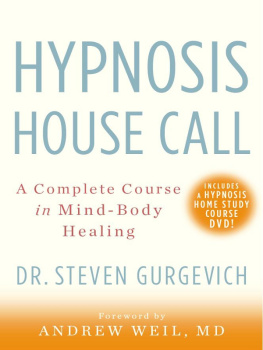Dabney M. Ewin MD
101 things
I wish Id
known when
I started using
hypnosis

Crown Housing Publishing Ltd
www.crownhouse.co.uk
First published by
Crown House Publishing Ltd
Crown Buildings, Bancyfelin, Carmarthen, Wales, SA33 5ND,
UK
www.crownhouse.co.uk
Dabney M. Ewin 2009
The right of Dabney M. Ewin to be identified as the author
of this work has been asserted by him in accordance with the
Copyright, Designs and Patents Act 1988.
All rights reserved. Except as permitted under current legislation
no part of this work may be photocopied, stored in a retrieval
system, published, performed in public, adapted, broadcast,
transmitted, recorded or reproduced in any form or by any means,
without the prior permission of the copyright owners. Enquiries
should be addressed to Crown House Publishing Limited.
British Library of Cataloguing-in-Publication Data
A catalogue entry for this book is available
from the British Library.
13-digit ISBN 978-184590291-9
eBook ISBN 978-184590458-6
Printed and bound in the UK by
The Cromwell Press, Wiltshire
The history of hypnosis is littered with stories of the
downfall of practitioners who were lured into grandiosity by
the siren song of cures that border on the miraculous. I
dedicate this composition to my wise and precious wife,
Marilyn, who has been my anchor to keep my feet on the
ground while my head was in the sky.
Contents
Foreword
I asked Dr. Ewin to tell me in one word how he would describe the essence of his professional life as a physician. His answer was clear, quick and passionate. This is a man whom we all admire for his intelligence, his effectiveness in treating patients, and his teaching. Yet it comes down to one word, his word: enthusiasm.
The words and phrases that come to a physician working over a lifetime are guides to the art of therapy. In many patients, symptoms fall into the cracks between mind and body and this elusive interface can only be reached with scientific insight and intuitive understanding. Dr. Ewin understands this and emboldens his art with vigor.
Dr. Ewin believes his patients can get well, because they do. With his words, images and suggestions, noted throughout this little book of wisdom, he changes the way his patients think, feel, and behave. He knows the mind can change the way the brain functions and he also knows the brain can change the way the mind functions. In hypnosis, he makes this healing resonance between mind and body happen again and again. Simply put, his patients become whole again.
I encourage each reader of this wonderful book to embrace Dr. Ewins lifetime of experience, make it fit into your own style, and teach it to others as you travel the path of your own career. For these are the secrets, these are the keys, and these are answers that work.
Peter B. Bloom, MD, Clinical Professor of Psychiatry,
University of Pennsylvania School of Medicine,
Past President, International Society of Hypnosis
Preface
Always read the little book.
Charles Dunlap, MD
One day in medical school our pathology professor, Dr. Dunlap, rolled in a small library of about thirty books, resembling the Encyclopedia Britannica. He told us it was a monumental compilation of everything that was known about diabetes, published in 1920, before the discovery of insulin. Then he held up a book of about 200 pages, and said, This was published in 1930, after the discovery of insulin. Always read the little book.
In addition to the economy of time, my experience has been that a small book is likely to be a clear message by a knowledgeable author. My copy of The Pursuit of Simplicity by Edward Teller, PhD, the physicist who produced the hydrogen bomb, is 167 pages. Sometimes a large edited book is a collection of little books (chapters), but that is rare.
I have sought to make this publication as little as possible, consistent with the message. Over the years I have jotted down various insights about hypnosis to pass on to my students, and this is the result.
Maleks Law: Any simple idea will be worded in the most complicated way.
Every violation of Maleks Law is a victory for education and communication. At the risk of being overly elemental, I have sought to reverse this common phenomenon, so that the most complicated idea is presented in the simplest way.
Dabney M. Ewin, MD, FACS
Words
We are treating people with words, so the dictionary and thesaurus are our pharmacopoeias. What we say, what we omit, and how we say it matters very much. Even without hypnosis, this is ancient knowledge. George Baglivi (1704), a prominent seventeenth century Italian physician wrote: I can scarce express what influence the physicians words have upon the patients life, and how much they sway the fancy; for a physician who has his tongue well hung, and is master of the art of persuading, fastens such a virtue upon his remedies and raises the faith and hope of the patient that sometimes he masters difficult diseases with the silliest remedies (emphasis mine). (Duct tape for warts? If you can influence the patient to believe it, it works!) What we call placebo in the waking state is much enhanced in hypnosis.
1. Seems
This is a very helpful word when doing a regression to a traumatic incident, particularly if there was a perceived danger of death.
I can say Even though it seems like you might be killed, isnt it nice to know that it only seems that way, because we already know that youre going to survive this, no matter how bad it seems.
2. Yet
This is a good word to use
when doing analysis.
Ideomotor signals are unconscious body movements initiated by an idea, like nodding the head when agreeing, and are generally referred to as body language. In hypnosis we use finger movements.
When setting up ideomotor signals, I have a finger to signal Im not ready to answer that question yet, or I dont want to answer it. He/she may not want to ever answer it, but when that finger rises I say to the patient Thats all right, you dont have to answer it yet, but you will know when the time is right to understand yourself fully. A question the patient doesnt want to answer is surely an important one, and we dont want the finality of just signaling, I dont want to answer.
3. Stop (not quit)
Quitters are losers.
In our society, to quit school is a disaster, to quit a job causes wonder if you were about to be fired and to quit a marriage is a failure of commitment and sad for the kids.
Quit has negative emotional content built into the word. When the whistle blows at 5 oclock, we stop work, but dont quit. Its emotionally much easier to stop a bad habit than to quit it.
4. Give up
Give up is a synonym for surrender.
Any boy whos ever wrestled with a bully who had him in a neck lock knows the humiliating demand Do you give up? If the pain is so bad that he gives up, there is residual anger and resentment.
Winston Churchill inspired the whole free world during the Second World War with his words We will never surrender! A therapist who tells a patient/client to give up a bad habit should consider giving up using that phrase. Its better to abandon, discontinue, reject, refuse, and so on.
5. Try
The word implies failure.
Next page





